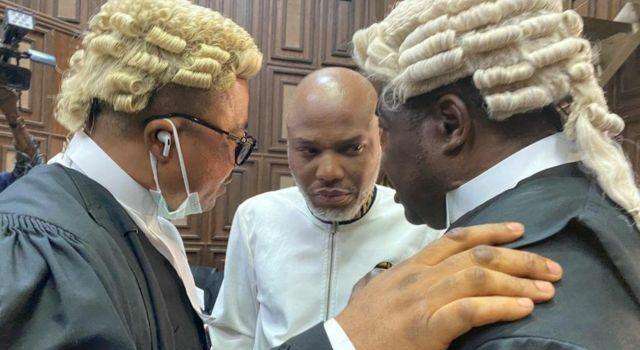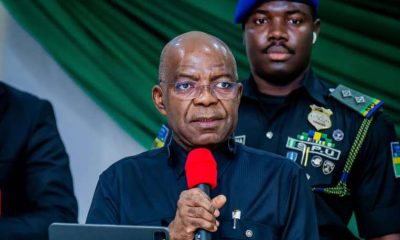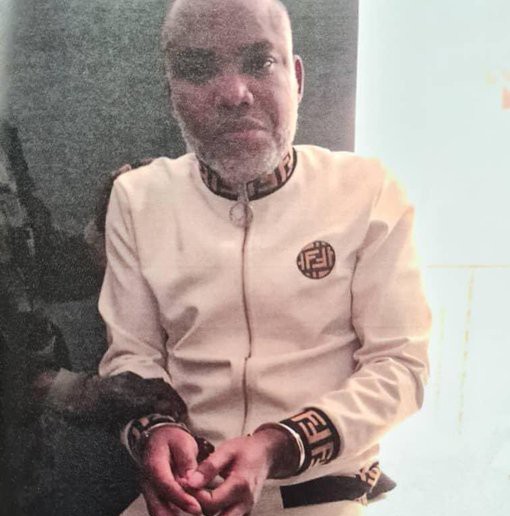Headline
Sowore’s push for Nnamdi Kanu’s freedom further worsens govt human rights record

Sowore
The chaos and violent suppression of the protest organized by human rights activist, Omoyele Sowore, last week has further worsened the image of the President Bola Tinubu’s administration in promoting justice and human rights. Although the trial of the Igbo separatist agitator and IPOB leader has entered its final phase, most people had expected the government to resolve the issue politically since the case has dragged on for seven years. Also, by still holding him when the Court of Appeal had granted him bail, it creates a dent on the image of government and belies its commitment to rule of law.
Kanu has been facing terrorism charges since 2015 filed by the Department of State Services (DSS).
He was then accused of criminal conspiracy, intimidation and illegal gathering in a 7- count charge.
He was granted bail but fled out of the country when soldiers stormed his house before he was forcefully brought back to Nigeria through Kenya in 2021. In 2022, the Federal government of Nigeria amended the charges and accused him of threatening National security after he was granted bail.
The allegations contained in the amended charge are the remaining seven counts earlier sustained by the trial court.
Amended Charges
According to the charge, Kanu made a broadcast that was heard across Nigeria, in which he issued a threat that anyone, who flouted a sit-at-home order in the south-east should write his or her will.
The federal government submitted that as a result of the threat, banks, schools, markets, shopping malls, and petrol stations in the south-east have continued to shut down their businesses, with citizens and vehicular movements grounded.
The federal government further alleged that Kanu’s broadcasts, made on different dates between 2018 and 2021, incited members of the public to attack Nigerian security personnel and their family members, thereby committing an offence punishable under section 1(2)(h) of the Terrorism Prevention Amendment Act, 2013.
It was also alleged that Kanu directed members of IPOB “to manufacture bombs,” adding that the defendant had between March and April 2015, “imported into Nigeria and kept in Ubuluisiuzor in Ihiala LGA of Anambra state within the jurisdiction of this honourable court, a radio transmitter known as Tram 50L concealed in a container of used household items, which he declared as used household items, and thereby committed an offence contrary to section 47(2)(a) of Criminal Code Act Cap, C45 Laws of the Federation of Nigeria 2004.”
All the efforts made to secure justice for Kanu or even granting him medical attention was not heeded by government and the IPOB leader has continued to languish in detention for the past five years.
Abuja Protest
Despite the warnings by the police, that the protest should not hold, Sowore defiled the order. Although arrests were made during the protest, which involved Uche Ejimofor, and Nnamdi Kanu’s brother, raising concern that they were targeted as Sowore was not arrested. The had explained those arrested breached the order restricting their movement to certain areas. However, Sowore was subsequently arrested the next day.
During that Abuja protest for Kanu, Nigerian police fired tear gas to disperse protesters, who had gathered, over the continued detention of the separatist leader.
The protesters, other activists and publisher of the Sahara Reporters news site, Sowore, who was on the front line, wanted the immediate release of Kanu, who they claimed, had been unduly kept in the cooler, for too long and wanted speedy adjudication of his trial.
The rioters at the scene said police officers fired multiple rounds of tear gas at people, who started to gather as early 7 am while the police was also accused of blocking major roads, causing heavy gridlock and confusion across several parts of the Federal capital Territory Abuja.
However, Sowore wrote on X that security operatives had arrested several individuals, including Kanu’s family members and legal team.
While responding to Sowore’s re-arrest via X (formerly Twitter), the Force Public Relations Officer, Benjamin Hundeyin, said the police acted within the law, adding that officers were empowered to use commensurate force to carry out their duties.
Hundeyin, who attached a remand warrant to his post, wrote, “Except we want to be mischievous, we all know that once court grants a suspect bail, it comes with the caveat that until the bail conditions are met, the suspect remains in custody.
“Where it is clearly spelt out on the remand warrant that the suspect be remanded in a correctional facility, not police custody, it is the duty of the police to hand over the suspect to the Nigeria Correctional Service, who would then process his bail conditions.
“This has always been the practice. Why should this be different? Also, as law enforcement officers, we are empowered by law to employ commensurate force to get our mandate achieved.”
The Police also explained the reasons why Sowore was transferred to Kuje Prison shortly after he was granted bail by the Kuje Magistrate Court in Abuja last Friday.
His arrest was as a result of his organization tagged “#FreeNnamdiKanu Now” protes last Monday, despite warnings from the police.
However, it was also alleged by the police that Sowore was arrested for insulting the IGP, Kayode Egbetokun, who he described as “useless and holding illegal position.”
The court granted bail to Sowore with N500,000 and two sureties, which his legal team was working to perfect at the time, the police hurriedly forced him into their vehicle and onward to Kuje Prison.
Speaking on the incident, human rights activist, and co-traveler with Sowore Deji Adeyanju, accused the police of violently attacking and removing Sowore moments after his bail was granted.
Adeyanju alleged that more than 50 armed officers stormed the court premises, descended on Sowore, and took him away by force while refusing to present a valid remand order.
“Sowore had just been granted bail, and while we were conferring with him here, the police suddenly launched an attack. More than 50 officers violently descended on him and took him away by force. We don’t even know where they have taken him,” he said.
Adeyanju said, “The officer flashed the document, and when we insisted on reviewing it, he pocketed it and ordered that they must go. When we asked where they were taking him, he said Kuje Prison. We demanded to see the remand order as endorsed by the court, but he refused.”
Sowore whose actions have been regarded as being antagonistic, has become a household name, within the police, Military and other security operatives circles, in Nigeria, since he started his activism as a student 35 years ago, at the University of Lagos (UNILAG).
He led his first protest as a student in 1989 over the IMF loan of $120 million for the Nigeria oil pipeline which conditions was not favourable to Nigerians and which also affected students in the tertiary institutions.
Sowore then a Geography Student at UNILAG, was arrested and tortured by the Military for leading another protest in 1992 which led to the death of seven people and he faced expulsion.
In Subsequent year,1993 he was involved in another protest, calling for the end of Military rule in Nigeria.
Reacting the arrest of Sowore , Emmanuel Onwobiko argued that his arrest by the police can’t always be said to be as a result of enforcing the law but sometimes about personal scores.
He said also that arrests of activists in Nigeria has always been an abuse of power, while he cited section 15(5) of the constitution of Nigeria, which stipulates the abolition of all corrupt practices and abuse of power.







